QuestionMy son's english cocker came when she was 7 wks. Now she is 10 wks. She already knew to go on a newspaper so we finally put her newspapers in the balcony after changing places 2-3 times the first 2 days. And I confined her to my computer room opening to the balcony. She had absolutely no trouble until I was given to fatigue and overslept. 5-10 minutes after I entered her room I saw this full size, very solid, still warm piece on her bedding. I did not see her do it so pushed her nose into it, hit hardish with paper while she was wagging her tail, then threw a tantrum, put the thing in her food dish (half eaten)and took the dish away after she sniffed it.
I started to watch her every second. Took her to bed with me, carried her out whenever she yelped with excellent result as before -but unfortunately after two days of this she fell from the kitchen table (within seconds, less than sniff-around time)dislocated a knee, and we don't know what else, and for two weeks she mostly struggled on her belly trying to pull unmoving hind legs behind her and needing someone to lift her belly up to start walking. Still, in that condition, even when I had to leave her several times for long hours alone in her room she went out to her paper, at nights lifting her legs over the door iron threshold, for even a couple of drops apart from a very messy pooping accident obviously due to her disability. Absolutely NO other accidents in that two weeks when she also learned "lie down","put your head down", "wait", "bite", "drop (even her most favorite treat,the boiled eggwhite for a bit of boiled yolk", a bit of "hold&wait" in addition to all minute nuances and expressions and sounds of "yes" and "no" and "good girl".
She gets well and starts jumping around again, meets my sister's 8 week husky, has a marvelous time, and the minute they leave I return from the door to see the puddle on my bed. This time I take no notice and neutralize the smell. We spend another perfect week. She is now allowed passage to my room from hers and I start thinking "after this dog, any other dog will be like getting off a BMW to drive a VW" then yesterday I oversleep again and return from washing my face to find the inevitable big-big puddle right in front of my bedroom door. I ignore and clean it hiding the fact that I saw and cleaned, go open the door for my sister and the husky. They again have a great time, and when they leave I go back to my room to find that full size, solid mass sitting in front of the chair where my sister sat. I throw another tantrum, confine her to the balcony and ever since that we are on excellent loving terms, play together a lot, learn a lot (I mean a lot - is that a stress factor?), she spends her time in my room or on my bed and waits for the moment when I leave the room to welcome me with her puddle. I even tried pinching her puss today until she yelped to get that wagging tail stop when I scold her. I feel very guilty, but something is very definitely wrong and I am not too sure it is me. YELP ME!!
AnswerIt is time to start all over again leaving out all the punishment. I can't believe rub their nose in it is still around.
Much of housebreaking is not training the puppy, but making it easier for your
puppy, you, and your carpet while its body to catches up to its instincts. At
around 8 weeks when the puppy goes to its new home, the time from when it
realizes it has to go, and when it can't wait any longer is a matter of
seconds. Only time will fix that. You can hardly be expected to be attentive
enough to avoid all accidents. There is no sense punishing the puppy for your
inattention. It is not fair to punish you either, but you still have to clean
it up if you didn't have the puppy outside in time.
Housebreaking starts before you get home with the new puppy. If you don't have
a crate, buy one. I prefer the more enclosed, den like plastic ones. Skip the
bedding. At first it gets wet, and later it can be chewed into choking
hazards. A wire grid in the bottom will help keep the puppy up out of
accidents at first. They are available with the crates, but expensive and hard to find. A piece of closely spaced wire closet shelving from a home supply place is cheaper. I am now using a plastic vegetable bin with plenty of holes drilled in the bottom. It helps block off part of the crate for the smaller puppy. If you already have a metal crate, covering it may help. Just make sure you use something the puppy can't pull in and chew. Dogs that start out in crates as little puppies, accept them very well. Never leave an unattended puppy loose in the house. If nobody can watch it, put it in the crate. I suggest letting the dog have its crate all its life. A crate needs to be just big enough for a dog to stretch out in.
Choose a command and spot you want it to use. The less accessible to strays,
the less chance of serious disease. If it is a female, choosing a non grassy spot will avoid brown spots later. When you bring it home, take it to the spot and give it the command in a firm, but friendly voice. Keep repeating the command and let the puppy sniff around. If it does anything, praise it. Really let it know what a good dog it is and how much you love it, and maybe a treat. Note, being out there not only means you can praise it, but it also keeps it from being snatched by a hawk. If it doesn't go, take it inside and give it a drink and any meals scheduled. A young puppy will need to go out immediately afterward. Go to the spot and follow the above routine. Praising it if it goes is extremely important. If it doesn't go, take it back inside and put it in its crate and try again soon. Do not let it loose in the house until it does go.
At first it is your responsibility to know and take the puppy out when it
needs to go. It needs to go out the first thing in the morning, after eating,
drinking, and sleeping. If it quits playing, and starts running around
sniffing, it is looking for a place to go. Take it out quickly. You will just
have to be what I call puppy broke until it is a little older. How successful you are depends on how attentive you are.
By the time most dogs are about 3 months old, they have figured out that if
they go to the door and stand, you will let them out. The praise slowly shifts
to going to the door. Some people hang a bell there for the dog to paw. If
your dog doesn't figure this out, try praising it and putting it out if it
even gets near the door. A stern "Bad dog!" is all the punishment that is
effective, and only when you catch it in the act and are sure you didn't miss
it going to the door. Clean up accidents promptly. I mostly keep the little
puppies out of the carpeted rooms. Still I need the can of carpet foam
sometimes. First blot up all the urine you can with a dry towel. Keep moving
it and stepping on it until a fresh area stays dry. A couple big putty knives
work well on bowel movements. Just slide one under it while holding it with
the other. This gets it up with a minimum of pushing it down into the carpet.
This works with even relatively soft ones, vomit, dirt from over turned house
plants, or anything else from solids to thick liquids. Finish up with a good
shot of carpet foam. Note, do not let the puppy lick up the carpet foam.
Once the dog is reliably housebroken, your carpet may need a good steam cleaning.
Many people strongly strongly push cleaning up all evidence of past accidents. I am slower to suggest that. Dogs will return to the same spot if they can find it. When you see one sniffing the spot, that is your clue to run it out.
The above can be applied to older dogs too. Biggest difference is the longer time after eating or drinking before they are ready to relieve themselves. If a dog has been living where it could keep its living space clean, it should quickly catch on. The important part will be teaching it that if it goes to the door, you will let it out. It will be much more difficult if the dog was forced to live in its filth. You will need to learn to read the dog and learn its schedule, and when it needs to go out. Keep it in sight, closing doors and setting up gates. Some people even leash the dog to themselves. I have used a tie down at my computer desk.
Some of the problem could be a deliberate challenge to your leadership. The key to most behavior problems is approaching things using the dog's natural instincts. Dogs see all the people and dogs in the household as a pack with each having their own rank in the pack and a top dog. Life is much easier if the 2 legged pack members outrank the 4 legged ones. You can learn to play the role of top dog by reading some books or going to a good obedience class. A good obedience class or book is about you being top dog, not about rewarding standard commands with a treat. Start at http://www.dogsbestfriend.com/ For more on being top dog, see http://www.dogbreedinfo.com./topdogrules.htm

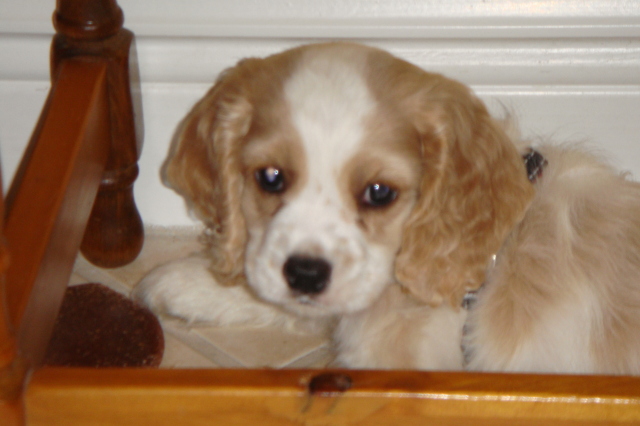 Differences between breeds
QuestionQUESTION: My puppy is 12 wks.old and weights ar
Differences between breeds
QuestionQUESTION: My puppy is 12 wks.old and weights ar
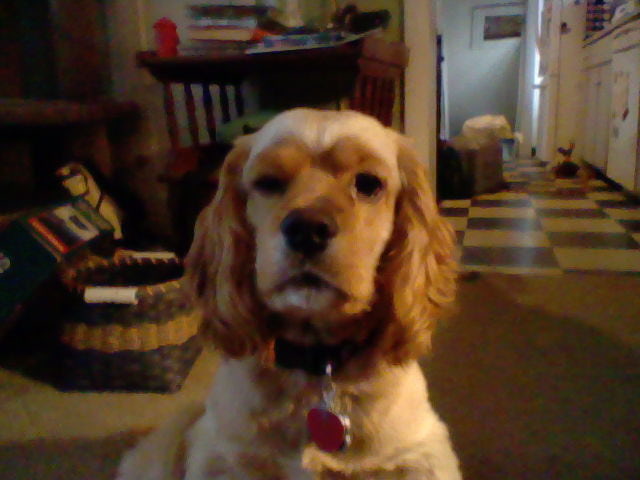 Rescue American Cocker unpredictable biting
Question
my 4 legged boy child
My husband and I
Rescue American Cocker unpredictable biting
Question
my 4 legged boy child
My husband and I
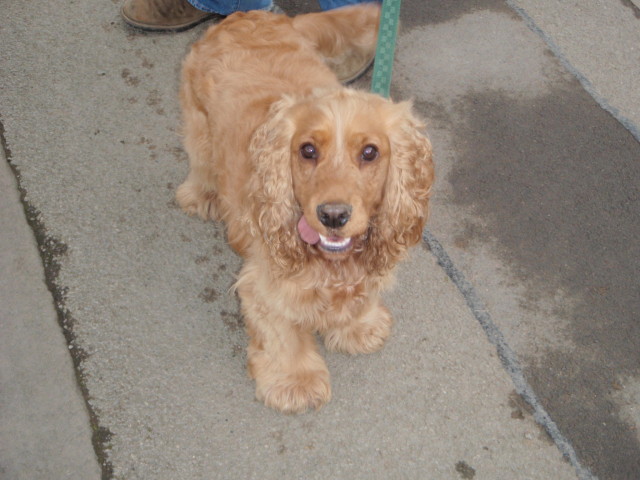 Troublesome Cocker
QuestionQUESTION: Hi Delores
I read through some of yo
Troublesome Cocker
QuestionQUESTION: Hi Delores
I read through some of yo
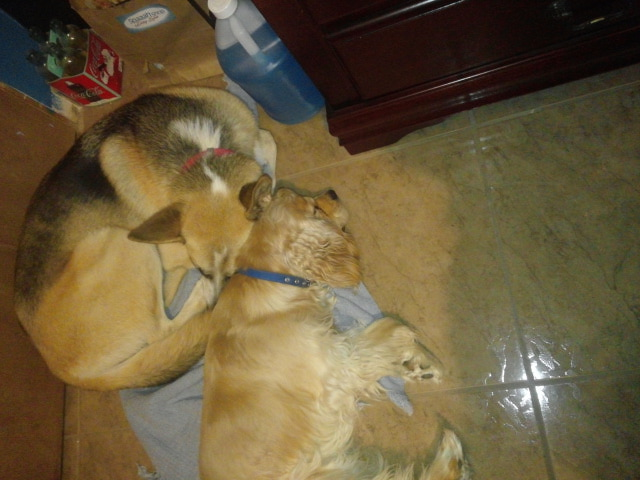 aggressive cocker spaniel
Question
see they get along gre
hi i have an 11
aggressive cocker spaniel
Question
see they get along gre
hi i have an 11
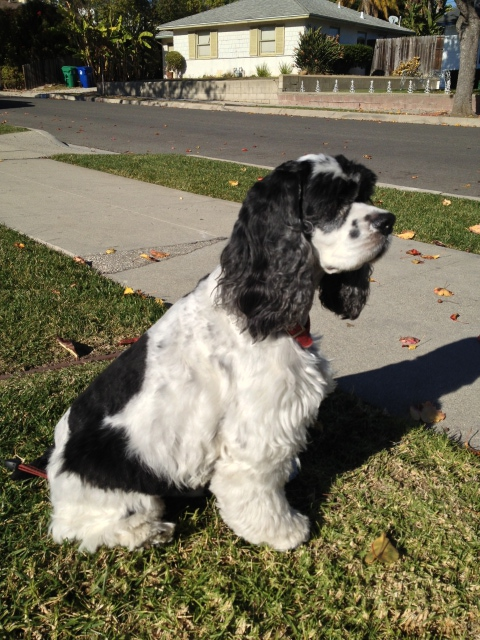 Cocker & Clinging Behavior
QuestionDooley
QUESTION: Dear Dr. Beck,
We have
Cocker & Clinging Behavior
QuestionDooley
QUESTION: Dear Dr. Beck,
We have